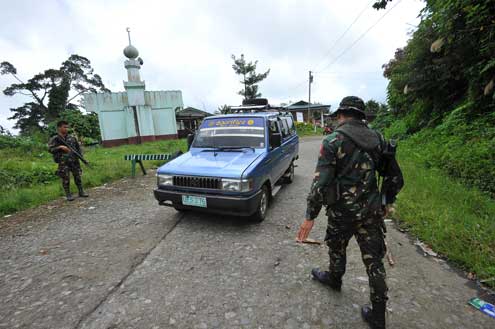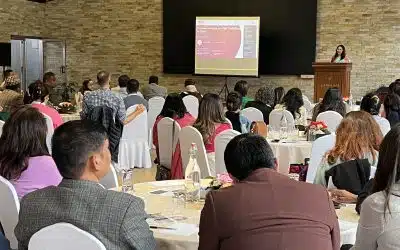InAsia
Insights and Analysis
Minorities within the Minority: Indigenous Communities in the Bangsamoro
August 6, 2014


In March this year, a major milestone passed in the 40-year effort to end hostilities in the Philippines between the national government and Muslim separatist fronts. Photo/Karl Grobl
As the drafting is ongoing, controversies have swirled about how the new Bangsamoro would treat non-Islamized indigenous communities – advocates for such communities assert that their core interests are not being accommodated, even though two of the 15 members of the Bangsamoro Transition Commission producing the first draft are indigenes themselves. Central is the issue of ancestral domain (singular) versus ancestral domains (plural).
Negotiations with the MILF that culminated in the CAB were to solve “the Bangsamoro problem.” From 2001, such a solution was taken to have several strands, including that of “Ancestral Domain.” Most well known was the abortive “Memorandum of Agreement on Ancestral Domain” that was initialed in 2008 but declared unconstitutional by the Philippine Supreme Court before it could be signed. Given this unhappy result (which was accompanied by an upsurge of violence displacing 750,000 persons), since then ancestral domain has been treated as one element of a more comprehensive approach, culiminating in the exclusive power of the Bangsamoro, according to the Annex on Power-Sharing signed in December 2013 over ancestral domain and natural resources.
At the same time, legal efforts to afford indigenous communities (some 17% of the Philippine population) legal instruments bolstering their security of tenure in ancestral lands (pertaining to individuals) and ancestral domain (for communities) have been gaining ground since the early 1990s. Under the Indigenous Peoples Rights Act (IPRA) of 1997, Certificates of Ancestral Domain Titles can be issued to indigenous communities, giving them power to manage the natural resources according to their customs and traditions. However, even though there are non-Muslim indigenous people located in the ARMM, IPRA was never operationalized in the region due to its autonomous status. When finally in 2013 a reform-minded ARMM administration wanted to cooperate with the IPRA-mandated National Commission on Indigenous Peoples to finally recognize an ancestral domain claim by Tidurays, the MILF objected in negotiations that this amounted to creating new facts on the ground in the middle of negotiations. Thus, the effort was stillborn.
This is not to say that the concerns of non-Muslims have been absent from the negotiations. Genealogies and tradition tell, after all, of two brothers – one who adopted Islam and one who did not – and both groups have stressed this shared ancestry. There have often been indigenous people on negotiating panels for both sides, and provisions in agreements mention their concerns. The upshot is that the next provision after the exclusive power over ancestral domain and natural resources is (quoted in full):
Protection of the rights of the indigenous peoples in the Bangsamoro in accordance with the United Nations Declaration on the Rights of Indigenous Peoples and taking into account, in addition to economic and geographical criteria, their individual and communal property rights, cultural integrity, customary beliefs, and historical and community traditions.
Indigenous people’s organizations and their allies, though, point out that what is missing from this is a recognition of their ancestral domains (plural). Immediately, lobbying sprang up both in the media and in Congress, and has found an echo among some members of the legislature. They may have the Bangsamoro Basic Law, currently being drafted for submission to Congress, reword the relevant provisions from the Comprehensive Agreement (perhaps by insisting that IPRA apply to the Bangsamoro). While the drafts of the Basic Law being discussed are still confidential, the MILF has disclosed that one of the points of disagreement is the pluralizing in a government version: substituting “domains” for “domain.”
The MILF has been firm on this matter, regarding those who press the case for recognition of plural ancestral domains as “spoilers” who are diluting the meaning of the Bangsamoro people and the Moro’s ancestral domain. However, many of those advocating this are, in fact, quite sympathetic to the peace process and have been operating for years under a “tri-people” framework trying to promote peace and development in Mindanao by bringing together Muslims, Lumads, and “settlers” (Christians whose family origins are from outside Mindanao).
Thus far the issue has generated more heat than light, and as activity moves from closed-door drafting of agreements and proposed bills to the more public halls of Congress, it behooves both sides to be more precise. For instance, indigenous peoples and their advocates should state precisely what is missing from the provision quoted above that would be included if IPRA was incorporated into the Bangsamoro Basic Law. And how their claim of separate “sub” ancestral domains would not weaken the case for a Bangsamoro identity (recognized in the CAB) and its ancestral domain.
The MILF, for its part, needs to provide reassurances about how fully this provision on the “rights of the indigenous peoples” will be implemented. A concrete example might be an open discussion of how territories of MILF camps and indigenous people’s ancestral domain might overlap, and how IPs “individual and communal property rights” will be respected in such places.
As Patrick Barron will point out on August 13 in part two of his In Asia blog post about subnational conflicts, when talking about why they are often neglected in bilateral relations between countries “Other things matter more. Subnational conflicts are usually marginal issues for bilateral relations.” An unfortunate parallel might be drawn when talking of negotiations between the national government and the Moro minority: some might think that other things matter more than the minority within the minority. That would not be in the spirit of equal rights for all.
Steven Rood is The Asia Foundation’s country representative in the Philippines. From 2009-2013 he observed negotiations between the government and the Moro Islamic Liberation Front as the Foundation’s representative on the International Contact Group. Since 2013 he has been a member of the Third Party Monitoring Team, overseeing the implementation of agreements. He tweets as @StevenRoodPH, and can be reached at [email protected]. The views and opinions expressed here are those of the author and not those of The Asia Foundation.
1 Comment
About our blog, InAsia
InAsia is posted and distributed every other Wednesday evening, Pacific Time. If you have any questions, please send an email to [email protected].
Contact
For questions about InAsia, or for our cross-post and re-use policy, please send an email to [email protected].The Asia Foundation
465 California St., 9th Floor
San Francisco, CA 94104
The Latest Across Asia
News
April 2, 2024
Program Snapshot
March 28, 2024
Program Snapshot
March 28, 2024
Program Snapshot
March 25, 2024

2024 Lotus Leadership Awards
Thursday, April 25, 2024, New York City
The Lotus Leadership Awards recognize contributions towards gender equality in Asia and the Pacific







It doesn’t mean that because there are two indigenous peoples representative in the BTC then the issue of IP shall be guarantee. Because your next question would be is, Does that IP representative really represent the real sentiments of the Indigenous People or does she or he has deep understanding of being an IP herself or himself? There are lot of IP but how deep is their understanding of being an IP? Second the process there are rules this is a number game even though how excellent is your proposals or shall we say responsive to the cause of the IP if your only alone in that crowd it will juts trample down. The main issue heir actually is that the IP have fundamental issue and land is the bedrock of their identity its not a simple issue of land it is were their cultures and customary laws shall govern as part of their justice system that must be respected protected by the state and its inviolable.